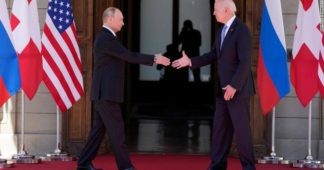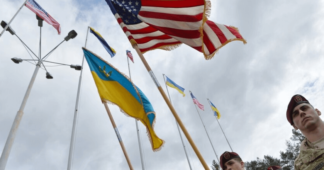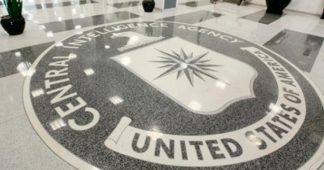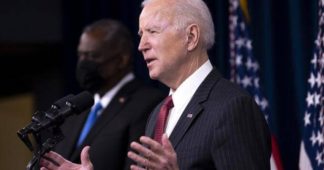Republicans can’t afford to leave foreign policy to the hawkish wing of their party, lest they risk fighting again for someone else’s war.
Doug Bandow
January 4, 2022
The drums of war are sounding in Washington, D.C., and Republicans are among the most enthusiastic backers of military action. Some enthusiastically, almost gleefully, suggest risking nuclear war.
This is no longer the party of Ronald Reagan, who sought to prevent conflict and especially nuclear conflict. Nor of earlier Republicans. During his vice-presidential run in 1976 Kansas Sen. Robert Dole denounced “Democrat wars of the 20th century.” Democratic presidents took America into World War I, World War II, the Korean War, and the Vietnam War. In retrospect, only the Second World War looks necessary, and even then the Democratic administration’s pre-war conduct, whatever its justification, was deceitful and reckless.
Today the most dangerous spot on earth might be Ukraine. Despite Washington’s foolhardy arrogance that led successive administrations to lie and expand NATO to Russia’s borders, dismember Serbia, stage multiple “color revolutions,” and promise alliance membership to Ukraine and Georgia, GOP legislators are pressing for direct confrontation with Russia. Most want to send arms. For instance, Rep. Mike Turner (R-Ohio) and 14 colleagues wrote a letter pressing President Joe Biden to provide intelligence and weapons to Ukraine.
Some advocate sending troops. In a separate letter with Rep. Mike Rodgers (R-Al.), Turner also advocated that the administration “deploy a U.S. military presence in the Black Sea to deter a Russian invasion.” Sen. Roger Wicker (R-Miss.) would go much further, proposing “military action” which, he explained, “could mean that we stand off with our ships in the Black Sea, and we rain destruction on Russian military capability.” That’s not all: “It could mean that we participate, and I would not rule that out, I would not rule out American troops on the ground. We don’t rule out first use nuclear action.”
Wicker put out a statement asserting: “President Biden should make clear that there is no scenario under which Ukraine will be overrun by Russia, period. Putin is already courting a bloodbath should he attack Ukrainian troops. President Biden should up the ante by warning him that an invasion would saddle him with an intolerably high Russian casualty count. This means leaving all options on the table and granting no concessions.”
Perhaps Wicker assumes that Putin will retreat before such threats. However, Ukraine matters far more to Russia and the latter enjoys local military superiority. The “bloodbath” that Wicker would enthusiastically impose on Moscow would also consume American and Ukrainian lives.
Equally irrational was Sen. Lindsey Graham’s endorsement of nuclear war against North Korea back in 2017. Long the loyal sidekick to war-happy John McCain, Graham gravitated toward Donald Trump, to whom the senator offered ostentatious subservience. That appears to include advocating nuclear war. In speaking about South Korea Graham explained: “If there’s going to be a war to stop [Kim Jong-un], it will be over there. If thousands die, they’re going to die over there. They’re not going to die here.” Graham added: “And that may be provocative, but not really. When you’re president of the United States, where does your allegiance lie? To the people of the United States.”
Graham’s war would result in hundreds of thousands, or more likely, millions of deaths. And many of them would be Americans. The Republic of Korea hosts a large US population, including service personnel, military dependents, students, and businessmen and women. In war American forces would surge in to fight North Korean ground forces. US citizens would die in droves. And the toll among South and North Koreans would be much greater. When the Clinton administration was contemplating military action against the North some analysts predicted a million deaths from a full-scale war.
That was in the “old days,” when the main threat was the numerous though decrepit North Korean conventional forces. Seoul’s proximity to the border left it vulnerable to missile and artillery attack even if Pyongyang’s tanks could not break through. Last year, reported the Rand Corporation: “North Korea maintains nearly 6,000 artillery systems within range of major South Korean population centers, which it could use to kill many thousands in just an hour, even without resorting to chemical or nuclear weapons.”
However, with enough nuclear materials to produce scores of nuclear weapons, the North also could lay waste to American possessions of Guam and Commonwealth of Mariana Islands, and Japan, including Okinawa, home to a Marine Expeditionary Force tagged for action in Korea. The casualty toll would further escalate if the North’s existing missiles could reach American territory beyond. Observed Harry Kazianis of the Center for the National Interest, war game results indicated that “There was no question millions of people would die—it was just a question of how many.”
The GOP’s 2016 presidential candidate class was filled with reckless statesmen-wannabes. Almost all advocated imposing a “no-fly” zone in Syria: Ohio Gov. John Kasich, former Hewlett-Packard CEO Carly Fiorina, former Florida Gov. Jeb Bush, neurosurgeon Ben Carson, Sen. Marco Rubio, New Jersey Gov. Chris Christie, and of course Graham.
Any serious “no-fly” zone would have to apply to Russia, an issue which most of the candidates avoided. But not Christie. When asked by host Wolf Blitzer if he was “prepared to shoot down that Russian plane and risk war with Russia,” Christie responded: “Not only would I be prepared to do it, I would do it. A no-fly zone means a no-fly zone, Wolf. That’s what it means.”
Then the governor, who apparently believed being tough in politics meant causing a traffic jam to inconvenience the residents of his political enemies, put on a full faux tough guy performance: “I would make very clear … I would talk to Vladimir Putin a lot. But I’d say to him, ‘Listen, Mr. President, there’s a no-fly zone in Syria; you fly in, it applies to you.’ And yes, we would shoot down the planes of Russian pilots if in fact they were stupid enough to think that this president was the same feckless weakling that the president we have in the Oval Office is right now.”
Mercifully the exchange ended there. Christie did not enlighten the audience as to what he would do if Putin responded by downing a couple American planes or destroying a training camp for US-backed insurgents, followed by issuing a nuclear alert. Russia could not allow itself to be bullied: it had more at stake in Syria and appeasing Washington would risk even more imperious American demands.
The Bush administration considered war with Russia over Georgia. Reported Politico’s Ben Smith: “With desperate Georgians begging for American help in closing down the key route through which Russian soldiers were pouring into the country, Bush’s national security aides outlined possible responses, including ‘the bombardment and sealing of the Roki Tunnel’ and other ‘surgical strikes,’ according to a new history of the conflict and independent interviews with former senior officials.”
Moscow certainly would have responded, creating an extraordinarily dangerous situation. Yet, reported Andrew Cockburn: Saakashvili’s “confidence may have been buoyed by back-channel assurances from minions of Vice-President Richard Cheney that the U.S. would in the end come to his aid. Secretary of State Condoleezza Rice and National Security Adviser Stephen Hadley feared that Cheney might indeed persuade Bush to intervene.” Today, some officials involved in the debate continue to wonder if they should have pushed for “harder options,” meaning war.
Obviously, not all Republican politicians plot new wars. Rep. Ron and Sen. Rand Paul famously opposed the Washington War Party. Sen. Mike Lee and Rep. Peter Meijer have been skeptics of America’s endless wars. Rep. Nancy Mace is a new face who has supported repealing the Iraq AUMF. And both Ronald Reagan and Donald Trump used the military only sparingly, avoiding new open-ended conflicts.
Yet even the latter offered no principled opposition to war. Warned Bonnie Kristian: “if another GOP president pushed for war in the wake of our hypothetical terrorist attack, most of the right would be raring to go.”
Republican Party officials appear almost mindlessly hawkish, even when clearly not in America’s interest. Incredibly, some officials are willing to risk nuclear war over peripheral stakes. Republican voters no longer can afford to leave foreign policy to the Washington elite, even their own. They risk finding themselves fighting and dying, again, in someone else’s war.
Published at responsiblestatecraft.org
We remind our readers that publication of articles on our site does not mean that we agree with what is written. Our policy is to publish anything which we consider of interest, so as to assist our readers in forming their opinions. Sometimes we even publish articles with which we totally disagree, since we believe it is important for our readers to be informed on as wide a spectrum of views as possible.











